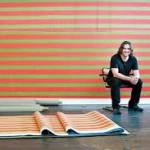Wade Guyton uses a computer printer to generate long strips of linen with red and green stripes. And he is the subject of a positive profile in The New York Times.
Guyton says this about his training: “I never really enjoyed drawing or art classes.”
 And about his inspiration: “I realized that the process of drawing didn’t make sense to me. The labor didn’t match up to what I was trying to do. And I thought the printer could make these things better than I could.”
And about his inspiration: “I realized that the process of drawing didn’t make sense to me. The labor didn’t match up to what I was trying to do. And I thought the printer could make these things better than I could.”
About the stripes: “It’s interesting for me to take something so insignificant and minor and affectless on its own and let it permeate in many different ways.”
Andy Warhol’s support is enlisted: “Warhol, after all, said: ‘Paintings are too hard. The things I want to show are mechanical. Machines have less problems.’”
A fellow artist gushes: “I was blown away. I must have gone back three or four times. I particularly admire the way he repeats motifs with just the slightest changes.”
Mistakes occurred in the making: “The largest of [the red-and-green striped canvases] — stretching 50 feet — has noticeable red smears of ink and the illusion of folds where the stripes were printed off-register … . ‘It would be wrong to have tried to correct these things,’ Mr. Guyton said.”
A learned professor helps us understand: “People tend to misread his work. They see it as only bound up with media and technology but it’s actually another version of the de-skilled, ready-made work.”
Indeed.
Source: Carol Vogel, “Painting Rebooted,” The New York Times, September 27, 2012. Viewed October 1, 2012. Thanks to J. G. for the link.
Related:
So it’s poorly printed wallpaper.
“Although Plato thus flows on with noiseless stream, he is none the less elevated. You know this because you have read the Republic and are familiar with his manner. ‘Those,’ says he, ‘who are destitute of wisdom and goodness and are ever present at carousels and the like are carried on the downward path, it seems, and wander thus throughout their life. They never look upwards to the truth, nor do they lift their heads, nor enjoy any pure and lasting pleasure, but like cattle they have their eyes ever cast downwards and bent upon the ground and upon their feeding-places, and they graze and grow fat and breed, and through their insatiate desire of these delights they kick and butt with horns and hoofs of iron and kill one another in their greed.” (Republic 9. 586a, at Perseus)
“This writer shows us, if only we were willing to pay him heed, that another way (beyond anything we have mentioned) leads to the sublime. And what, and what manner of way, may that be? It is the imitation and emulation of previous great poets and writers. And let this, my dear friend, be an aim to which we steadfastly apply ourselves.” (Longinus – On the Sublime XIII)
Indeed, Michael.